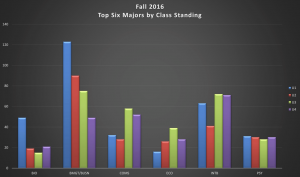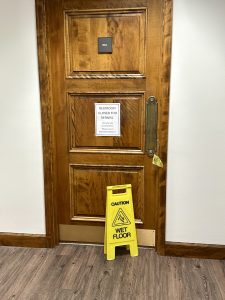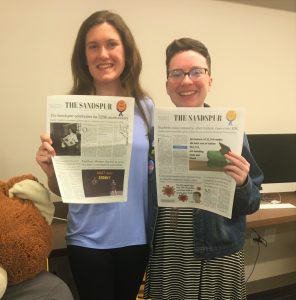
Rollins recently underwent an evaluation commonly known as SWOT (Strengths, Weaknesses, Opportunities, and Threats) to rethink the college’s future academic policies.
As part of this endeavor, the school came up with twelve strategic question, each of which was assigned a task force for discussion. The task force split into two parts: the first committee focused on specifying the college’s mission, while the second committee brainstormed new ways to handle what the SWOT documents refer to as an “imbalance” in majors. Although there is a wide variety of majors offered to Rollins students, the three business majors are currently being pursued by 657 students, a massive percentage of the student body, as of Fall 2016.
The committee has written a proposal that would change the way students declare their majors.
“The main change is that students would defer their declaration of a major until they have taken two courses in that major and two courses from other divisions. This will help the college better anticipate class need. It should have no impact on the students, as they will still be able to take courses that they want and start working toward a major as soon as they are ready,” explained Dr. Claire Strom, Director of General Education and member of the Curriculum Committee.
If future students show a strong preference for a major, their transcript would be marked “Exploring—Department.” If a strong preference is not expressed, the student’s transcript would be marked “Exploring.”
Under the new system, students would likely declare majors at the beginning of their sophomore year or the end of their first semester, depending on how many courses they took in their first year and what majors these courses focused on.
If a student declares a major in one of the divisions of the liberal arts, the current proposal also mentions allowing students to not take a neighborhood class in that area—potentially lowering the number of general education courses required for liberal arts majors to graduate from Rollins.
To write this proposal, the committee underwent four steps: collecting data; gathering ideas and proposals with colloquies, forums, and a faculty survey; task force meetings and assessments; and establishing a consensus. If passed, the committee wants to have the changes in place for the students entering in Fall 2017.
“We’re hoping for the next class,” reported Dr. Mario D’Amato, Chair of the Curriculum Committee. “If something gets deferred too long, it’s going to fall to the wayside.”
To get this large a change to the academic policy of Rollins College passed, there is a three-step process that must be completed. The proposal needs to first go through the Curriculum Committee, then the Executive Committee (part of faculty governance), and finally be brought to the faculty floor.
Students also have input in the process—SGA held a discussion on Tuesday in Bush Auditorium for students to make comments on and learn about the potential alterations to the major declaration process.
“The Student Government Association has [played] and continues to play a vital role in the college’s strategic initiatives by having a seat at the table throughout the process and voicing the students’ concerns,” said Matthew Cassidy, SGA President.
“Members of SGA contribute a fresh student perspective to committees and task forces primarily comprised of faculty and staff.”
The Sandspur will continue to cover SWOT and the changes that might affect students in future issues.






















Be First to Comment